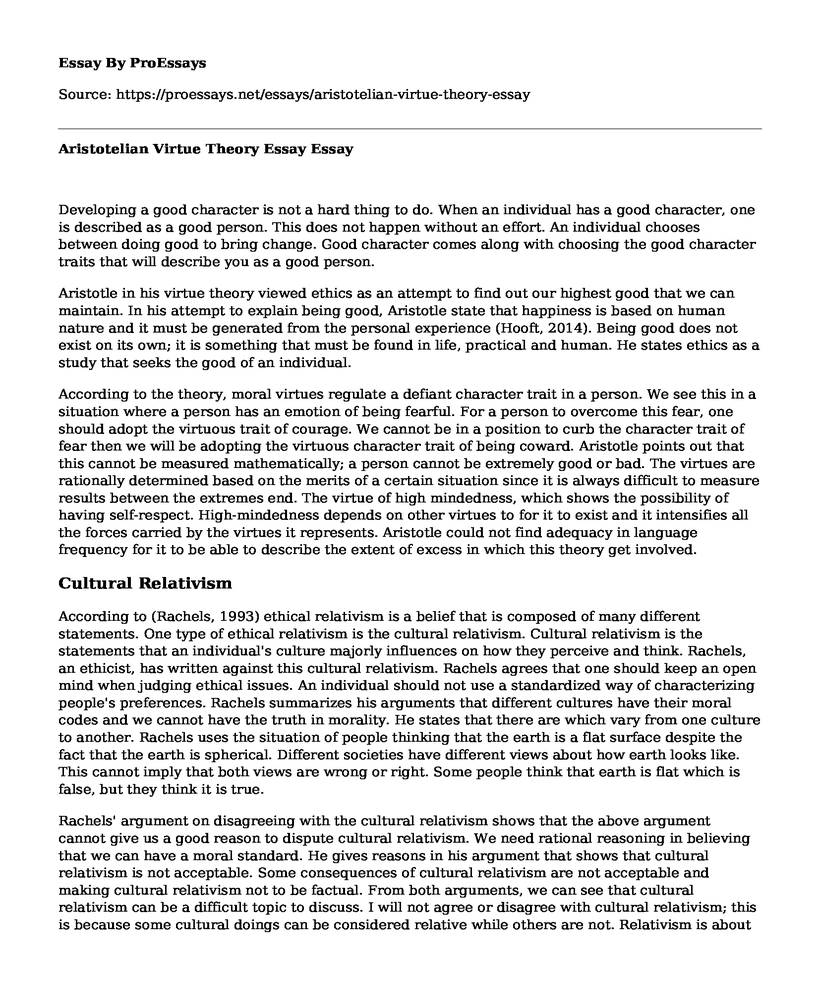Developing a good character is not a hard thing to do. When an individual has a good character, one is described as a good person. This does not happen without an effort. An individual chooses between doing good to bring change. Good character comes along with choosing the good character traits that will describe you as a good person.
Aristotle in his virtue theory viewed ethics as an attempt to find out our highest good that we can maintain. In his attempt to explain being good, Aristotle state that happiness is based on human nature and it must be generated from the personal experience (Hooft, 2014). Being good does not exist on its own; it is something that must be found in life, practical and human. He states ethics as a study that seeks the good of an individual.
According to the theory, moral virtues regulate a defiant character trait in a person. We see this in a situation where a person has an emotion of being fearful. For a person to overcome this fear, one should adopt the virtuous trait of courage. We cannot be in a position to curb the character trait of fear then we will be adopting the virtuous character trait of being coward. Aristotle points out that this cannot be measured mathematically; a person cannot be extremely good or bad. The virtues are rationally determined based on the merits of a certain situation since it is always difficult to measure results between the extremes end. The virtue of high mindedness, which shows the possibility of having self-respect. High-mindedness depends on other virtues to for it to exist and it intensifies all the forces carried by the virtues it represents. Aristotle could not find adequacy in language frequency for it to be able to describe the extent of excess in which this theory get involved.
Cultural Relativism
According to (Rachels, 1993) ethical relativism is a belief that is composed of many different statements. One type of ethical relativism is the cultural relativism. Cultural relativism is the statements that an individual's culture majorly influences on how they perceive and think. Rachels, an ethicist, has written against this cultural relativism. Rachels agrees that one should keep an open mind when judging ethical issues. An individual should not use a standardized way of characterizing people's preferences. Rachels summarizes his arguments that different cultures have their moral codes and we cannot have the truth in morality. He states that there are which vary from one culture to another. Rachels uses the situation of people thinking that the earth is a flat surface despite the fact that the earth is spherical. Different societies have different views about how earth looks like. This cannot imply that both views are wrong or right. Some people think that earth is flat which is false, but they think it is true.
Rachels' argument on disagreeing with the cultural relativism shows that the above argument cannot give us a good reason to dispute cultural relativism. We need rational reasoning in believing that we can have a moral standard. He gives reasons in his argument that shows that cultural relativism is not acceptable. Some consequences of cultural relativism are not acceptable and making cultural relativism not to be factual. From both arguments, we can see that cultural relativism can be a difficult topic to discuss. I will not agree or disagree with cultural relativism; this is because some cultural doings can be considered relative while others are not. Relativism is about beliefs, and there is no absolute truth about it.
References
Van Hooft, S. (2014). Understanding virtue ethics. Routledge.
Rachels, J., & Rachels, S. (1993). The elements of moral philosophy.
Cite this page
Aristotelian Virtue Theory Essay. (2022, Mar 29). Retrieved from https://proessays.net/essays/aristotelian-virtue-theory-essay
If you are the original author of this essay and no longer wish to have it published on the ProEssays website, please click below to request its removal:
- Ethical Standards to Obtain Ethics Approval
- Abortion: Ethical Theories and Principles Essay
- Essay on Morality: Drug Legalization versus Drug Prohibition of Hard Drugs
- Essay Sample on Social Philosophy - Ethics
- Are People Born Criminals? Essay Example
- Essay Sample on Discovering Your Identity in Christ: Benefits and Reasons
- Essay Sample on Whether Abortion is Morally Justifiable







